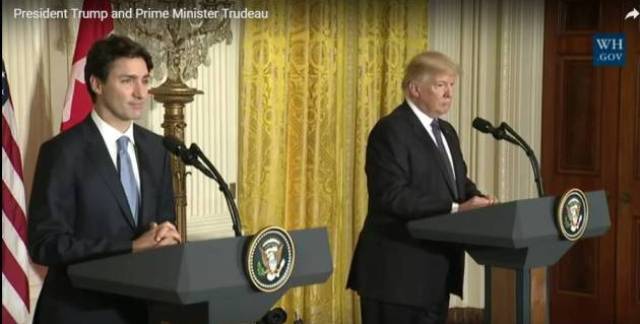 Prime Minister Justin Trudeau and President Donald Trump in 2017. [White House photo]
Prime Minister Justin Trudeau and President Donald Trump in 2017. [White House photo]
[This is an excerpt from an article in the current edition of The Round Table: The Commonwealth Journal of International Affairs.]
If Trump’s retreat from multilateralism increasingly left Canada without its reliable anchors in global politics, Trump’s other geostrategic moves also left Canada alone in the world. This was particularly true of relations with China. After Trump came to office in 2016, relations with the People’s Republic of China grew increasingly fractious, partly because of Beijing’s new assertiveness after Xi Jinping came to power in 2012–13; partly because of a growing consensus in official Washington that efforts to engage China in its rise to great power status were not working; but mostly because Trump’s candidacy in 2015–16 had been in part built on bashing China for ‘taking advantage’ of Americans in the area of trade. As a result, in his first three years in office Trump himself devoted considerable efforts to ‘making China pay’ through the imposition of tariffs (that, of course, Americans, not the Chinese, paid for) and the negotiation of a trade agreement. In addition, the U.S. Department of Defense and the national security adviser ensured that the idea that China (and the Russian Federation) were ‘revisionist’ powers that were seeking a world antithetical to the interests of the United States was entrenched in the 2017 iteration of the National Security Strategy. The Trump administration also continued its long-standing dispute with Huawei Technologies, a Chinese information and communications technology company seeking to land a predominant place in the global market for the provision of 5G technology for broadband cellular networks. By 2019, the Los Angeles Times was characterising the moves against Huawei as a ‘war’ in which the U.S. was ‘trying to destroy China’s most successful brand’.
Canada had already been affected by these efforts before the pandemic. On 1 December 2018, at the request of the United States, Canada arrested Meng Wanzhou, Huawei’s chief financial officer and daughter of the firm’s founder, Ren Zhengfei, as she was passing through Vancouver from Hong Kong to Mexico City. On 10 December, Chinese authorities arrested two Canadian citizens, Michael Kovrig and Michael Spavor, and have held them as hostages since then in retaliation for the Meng arrest. The very next day, Trump said in an interview that he would interfere in the Meng case ‘if I think it’s good for what will be certainly be the largest trade deal ever made’. While Trump may not have even been aware of the ‘two Michaels’ when he made his comments, his administration did virtually nothing to assist Canada in this case.
The COVID-19 pandemic accelerated tensions between Washington and Beijing, particularly after early reciprocal accusations about the origin of the coronavirus. Chinese officials claimed, without evidence, that U.S. service members visiting Wuhan for the Military World Games had brought COVID-19 with them; for his part, Trump claimed, equally without evidence, that the coronavirus originated in a lab in Wuhan. Trump then escalated his rhetorical attacks against China for the pandemic, calling COVID-19 the ‘plague from China,’ ‘kung flu,’ and ‘Wuhan virus.’ Indeed, Washington’s insistence that the phrase ‘Wuhan virus’ be included in the joint statement of a summit of G7 foreign ministers prompted the summit to abandon a final communique. But the tension was more than rhetorical: over the course of 2020, Washington and Beijing engaged in tit-for-tat sanctions against each other. For Canada, the radical escalation in Sino-American tensions during the pandemic highlighted the degree to which the evolving geostrategic environment leaves Canada vulnerable to the emerging great-power competition.
Conclusion
In 2019, Chrystia Freeland, then Canada’s foreign minister, admitted to The Economist that one of her favourite books was Robert Kagan’s (2018) The Jungle Grows Back, which argued that the liberal world order ‘is fragile and impermanent. Like a garden, it is ever under siege from the natural forces of history, the jungle whose vines and weeds constantly threaten to overwhelm it’ (p. 4). By 2020, Trudeau had promoted Freeland to be deputy prime minister and minister of finance, but the jungle she was concerned about in 2019 continued to bedevil Canada. The COVID-19 pandemic accelerated a geostrategic shift that had started many years earlier. The election of Donald J. Trump in 2016 confirmed Zakaria’s 2012 prediction that the ‘post-American world’ would soon arrive, even if Zakaria could not have anticipated that the post-American era he sketched would have been ushered in by the U.S. president himself.
Such developments have left Canada in a fraught place geopolitically.
Kim Richard Nossal is with the Department of Political Studies, Queen’s University, Kingston, Ontario, Canada.



